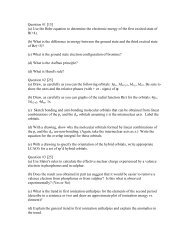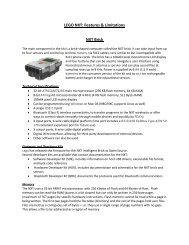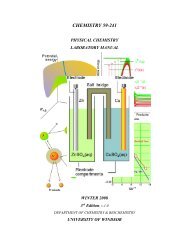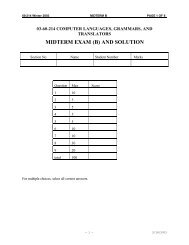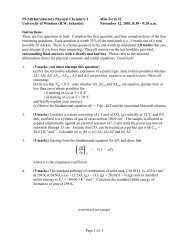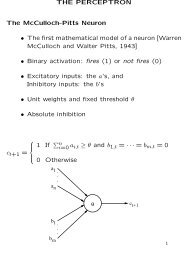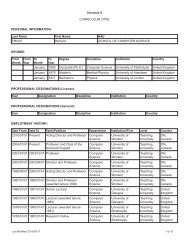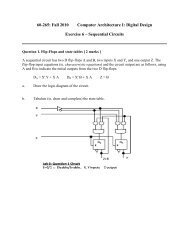Adjectives: A Uniform Semantic Approach - University of Windsor
Adjectives: A Uniform Semantic Approach - University of Windsor
Adjectives: A Uniform Semantic Approach - University of Windsor
Create successful ePaper yourself
Turn your PDF publications into a flip-book with our unique Google optimized e-Paper software.
332 N. Abdullah and R.A. Frost<br />
2 Fake Guns Are Guns<br />
Language is inherently generative. With its, rather limited, stock <strong>of</strong> linguistic items it<br />
is capable <strong>of</strong> expressing novel concepts by means <strong>of</strong> combining existing linguistic<br />
items. In some cases, however, and because <strong>of</strong> the dynamic nature <strong>of</strong> concepts, new<br />
referents may fall under an already-existing concept. For example, in number theory,<br />
a number used to denote a natural number. With the conception <strong>of</strong> negative numbers,<br />
the concept “number” encompasses both negative and positive numbers. This process<br />
continued (and may continue) to include different kinds <strong>of</strong> numbers. This is because<br />
there is so much in common between the entities or mathematical objects we now call<br />
numbers.<br />
In everyday language this process, we argue, is generally in use—consider, for<br />
instance the category “bird”, as much studied and illustrated in prototype theory and<br />
default logics with regard to the property <strong>of</strong> “flying”—and specifically with regard to<br />
privative-noun combinations. A fake gun and a real gun have many properties in<br />
common—similarly, an artificial heart and a real heart. In some cases, the distinction<br />
between an instance <strong>of</strong> the denotation <strong>of</strong> a default-noun combination and that <strong>of</strong> a<br />
privative-noun combination is hard to tell, or requires domain knowledge, e.g.<br />
artificial light versus natural light, Table 1—if there is a difference, indeed. If it were<br />
for things denoted by a privative-noun combination not to fall under the extension<br />
denoted by the noun, there might have been a dedicated lexeme—interestingly, even<br />
the word robot (i.e. a single linguistic item) is originally chosen by the Czech<br />
playwright Karl Čopek (1890-1938) as a more suitable term for “artificial workers” in<br />
his play Rossum's Universal Robots 3 . Of course, this is not to claim that a concept<br />
must be denoted by a single lexeme. What is meant, however, is that the frequent use<br />
<strong>of</strong> a concept is usually reflected in language by being represented by a single<br />
linguistic symbol, as is the case with common nouns. Therefore, in answering the<br />
question <strong>of</strong> what is a fake gun, we argue that it is a gun, provided that fake and real<br />
guns are subsumed by the term ‘gun’.<br />
The notion <strong>of</strong> augmenting the concept, or equally the extension, denoted by the<br />
noun in an adjective-noun combination, is linguistically supported. In language, it is<br />
noticed that all privative adjectives have antonyms/contrasts, e.g. intensifiers.<br />
Privatives such as fake, artificial, and false have antonyms/contrast, respectively,<br />
real/genuine, natural, and true. It seems that there is a strong pairing between<br />
privatives and their (intensifier) counterparts to the extent that the use <strong>of</strong> the privative<br />
antonym is meaningless, if possible indeed, in isolation with its counterpart. The<br />
intensifier is usually implicit. Most <strong>of</strong> the time it is considered default or redundant<br />
when there is no ambiguity. The compound real fur is deemed necessary only when<br />
there is fake fur in the vicinity.<br />
[12] reaches the conclusion that privative adjectives are subsective based on work<br />
done by other researchers (e.g., see, [11]) on the “Noun Phrase-split phenomena” in<br />
Polish, which reveals the absence <strong>of</strong> the privative adjective class in Polish. That is, the<br />
presence <strong>of</strong> the privative class <strong>of</strong> adjectives is an idiosyncrasy <strong>of</strong> some languages and<br />
English is one <strong>of</strong> them.<br />
3 See, http://capek.misto.cz/english/interesting.html for a translation <strong>of</strong> an article by the author<br />
<strong>of</strong> the play in the Lidove Noviny, 24.12.1933.



